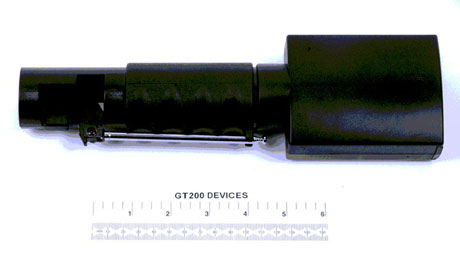Three British government departments and agencies promoted the international sale of fake bomb detectors which are thought to have cost lives, despite a government-wide warning that they were useless.
On Tuesday, Kent businessman Gary Bolton (47) was jailed for seven years at the Old Bailey criminal court in London for fraud over the sale of thousands of devices based on novelty golf ball finders which he claimed could detect explosives and drugs but which detectives said were “nothing more than plastic handles with aerials as antennae”.
In the aftermath of Bolton’s sentencing, it can be revealed that the Ministry of Defence, the Foreign and Commonwealth Office and the government’s trade arm, UKTI, gave promotional, diplomatic and financial backing to Bolton over several years even though a Home Office expert in bomb detection equipment found his device’s ability to detect explosives was no better than random. In Thailand, where hundreds of the bogus devices were sold under the brand GT200 for use at police and army checkpoints, human rights campaigners have reported they failed to detect bombs that then killed four people. Hundreds more have been wrongly imprisoned after the fake equipment indicated they had handled explosives. The devices were sold to security hotspots including Pakistan, India and Egypt as well as Mexico, where authorities fighting a bloody drugs war bought 1,200 of the units.
Last night, ministers were under pressure to mount an urgent investigation into Whitehall’s role in the trade, which one MP labelled “a national embarrassment”. The devices cost Bolton as little as £1.82 to make but were sold for as much as £15,000 each, resulting in a trade worth up to £3 million a year. A Home Office scientist who ran a test in 2001 that demonstrated the so-called bomb detector was useless said on Tuesday he had issued a written warning against the device which was circulated to at least 1,000 officials across Whitehall, the military and police departments.
Following the trial, the business department has admitted that "UKTI provided advice on overseas markets through the Overseas Market Introduction Service and support to attend trade shows overseas through the Tradeshow Access Programme". In Mexico, "sales meetings sometimes took place in the embassy or the residence, occasionally with the presence of the ambassador," the court heard. Paxman even wrote to the state authorities in Sonora, which borders the US, "emphasising the excellence of the UK security industry".
Bolton's sentence follows that of his former business partner, Jim McCormick, who was jailed for 10 years in May for selling around £50m worth of similar devices, many to post-war Iraq, where their use is thought to have cost lives. Speaking in mitigation, Jonathan Higgs QC, said Bolton has three children, including a eight-month-old baby, and had been diagnosed with depression, which the judge said he was sceptical about given he was a fraudster.

In his remarks, the judge said Bolton's "glib salesmanship persuaded these agencies to support the sales" and concluded: "You have damaged the reputation of British trade abroad, having duped UKTI and other agencies dedicated to supporting the export of quality British goods as opposed to the dross that you manufactured."
At the time of his arrest last year Bolton admitted "he had no background in science, research, training or specifically security" and he called in his defence an expert in dowsing, a method of "divining" for water using sticks.
A spokesman for the Foreign Office said: "The government supports thousands of British companies around the world each year in our efforts to help boost trade and investment. Global Technical received limited support from the embassy in Mexico prior to any suggestion that their activity was fraudulent."
No comments:
Post a Comment